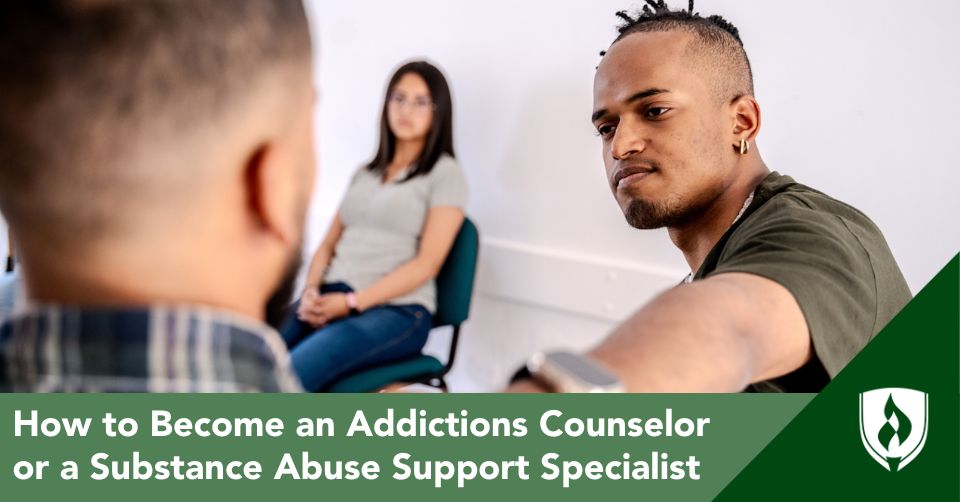How to Become an Addictions Counselor or a Substance Abuse Support Specialist
By Noelle Hartt on 06/20/2024

If there was ever a time to consider becoming a substance abuse counselor, it’s now. More than 48 million people throughout the US reported they’d struggled with substance use disorders within the past year, as of 2022.1
Drug and alcohol addiction afflict people from all walks of life. According to the National Institute of Mental Health, “Substance use disorder (SUD) is a treatable mental disorder that affects a person’s brain and behavior, leading to their inability to control their use of substances like legal or illegal drugs, alcohol, or medications.”2
The more we understand the connection between mental health and substance abuse, the better we’re able to aid those combating alcohol and drug addiction. If you’re interested in helping, keep reading as we lay out some options.
What’s the difference between an addiction counselor and a substance abuse counselor?
When it comes to your career path and professional aspirations, there’s no getting around the importance of understanding what’s in a job title. Academic, licensure, and certification requirements to become a substance counselor or addiction counselor vary from state to state. It is important to check with the state agency in your state of residence the academic, licensure, and certification requirements needed to become a substance or addiction counselor.
There’s a lot of crossover and confusion with job titles in these areas. Titles like “substance abuse counselor” and “addictions counselor” can be interchangeable. Other names given to professionals in these roles may include:
- Case manager
- Chemical Dependency Professional and Alcohol and Drug Counselor
- Certified Alcohol and Drug Counselor (CADC)
- Chemical Dependency Counselor (CD Counselor)
- Chemical dependency professional
- Clinical counselor
- Counselor
- Drug and Alcohol Treatment Specialist (DATS)
- Prevention specialist
- SA Counselor (substance abuse counselor)3
It’s important to note, however, that some these titles-such as Alcohol and Drug Counselor-apply to addiction professionals who have or are required by state law to obtain specific academic credentials, certification and/or licensure.
Ultimately, substance abuse/addiction counselors share a goal to help others recover from substance use disorders. The specifics in terms of how these professionals work tend to vary, depending on where they work. Still, some common responsibilities identified by the Bureau of Labor Statistics (BLS) include:4
- Evaluating clients’ mental and physical health and behavior to determine if they are ready for treatment
- Creating, sharing and reviewing treatment plans with clients and their loved ones
- Helping clients adopt the required skills and behaviors for overcoming and recovering from addiction
- Assisting clients in pinpointing the choices and situations that may compromise their recovery efforts
- Documenting clients’ progress
- Informing clients’ families about alcohol and drug addiction, as well as behavior disorders, to help them determine strategic methods to support their loved ones in recovery
- Connecting clients with helpful resources like job placement services and support groups
- Creating discharge plans to help clients transition out of counseling
- Engaging in community outreach programs to help people understand more about addiction as a behavioral disorder and how to prevent substance abuse
How do you become an addiction or substance abuse counselor?
1. First of all, it's complicated
Deciding on education for this career goal is tricky. Each state defines its own requirements and credentialing process for substance abuse counselors. Licensure and certification requirements also differ from place to place.
"Many substance abuse counselor roles only require a Bachelor's degree, but that is state specific," says Dr. Rikkisha Gilmore-Byrd, Dean of Human Services at Rasmussen University.
For instance, New York allows individuals with no formal education beyond a high school diploma or High School Equivalency (HSE) diploma to become Credentialed Alcoholism and Substance Abuse Counselors (CASACs).
But Georgia designates different credentials—each of which has its own education requirements—to different types of alcohol and drug counselors.5 So, if you want to become a Level I Certified Alcohol & Drug Counselor (CADC-I) in Georgia, you’d need only a high school diploma or GED, as far as your education is concerned.
A designated number of direct work experience and clinical supervision hours are also required. It is important to check with the Alcohol & Drug Abuse Certification Board of Georgia regarding the hours of direct work experience and clinical supervision necessary.
But if, you wanted to pursue the more advanced CADC-II credential, you’d need at least a Bachelor’s degree in the Human Services field. A designated number of direct work experience and clinical supervision hours are also required. It is important to check with the Alcohol & Drug Abuse Certification Board of Georgia regarding the hours of direct work experience and clinical supervision that are required.
2. Determine your education based on state
On top of the difference in state-by-state requirements for education and licensure in addiction counseling, there are also many different educational paths you can take to arrive at substance abuse counseling.
If your state allows addiction counselors to hold a bachelor's degree, obtaining a Bachelor's in Human Services is a good first step. But if you already have a degree, your path might be different.
For example, if you are a licensed psychologist, physician or nurse in Nevada, you are not required to obtain additional licensure to provide alcohol and drug abuse counseling services.6
This makes your state's specific regulation the first place you need to go. Research what the requirements are for substance abuse counselors in your area, and go from there.
3. Obtain licensure/certification in your state
If you want to become a substance abuse counselor or a licensed addiction counselor, you'll first need to decide what kind of license or academic credential you'll need. If you want to work in an inpatient treatment center, you might need different things than if you want to work in a community service center.
Again, it's a state-by-state situation, and sometimes an employer-by-employer situation.
New Mexico requires substance abuse and addiction counselors to be licensed as an LADAC (Licensed Alcohol and Drug Abuse Counselor). There is a restricted licensure option which is the LSAA (Licensed Substance Abuse Associate).6
Work experience matters for licensure as well. The Illinois Certification Board mandates 4,000 hours of paid alcohol and other drug (AOD) work experience for anybody applying for the Certified Alcohol and Other Drug Counselor (CADC) credential.7
4. Keep up with continuing education
Many states also require drug and alcohol counselors to complete continuing education courses throughout their careers. This is important to keep up with important changes in the field. Your continuing education units (CEUs) will be specific to your state and address everything from new challenges (a new addiction-forming drug, for example) to legislation that might impact your work.
Where does a substance abuse or addiction counselor work?
As you can see, your employer can make a big difference in the kind of work you do, as well as what you need to get there.
Substance abuse counselors work in a variety of settings. The Bureau of Labor Statistics combines data for substance abuse, behavioral disorder and mental health counselors all together. The largest employers of these professionals are as follows:8
- Outpatient mental health and substance abuse centers
- Individual and family services
- Offices of other health practitioners
- State, local and private hospitals
- Residential mental health and substance abuse facilities
Most of these categories are self-explanatory, with the exception of “individual and family services.” This term refers to social assistance or social services.
The BLS also notes that “some addiction counselors work in residential treatment centers, where clients live in the facility during their recovery.”8 Sober houses are a good example of this kind of location.
What skills/traits are important for a career as an alcohol and drug counselor?
A substance abuse counselor is a type of mental health professional. If you work in addiction recovery, there are definitely some skill areas you should be strong in.
Active listening
Active listening is a non-negotiable skill in both traditional mental health counseling and substance abuse counseling.
People who suffer from addiction tend to experience complicated feelings and other personal struggles. Since addiction can wreak havoc on personal relationships, they might be very isolated. They may feel as though nobody else in their lives is willing to listen to them.
Strong oral communication
The role of an alcohol and drug counselor is to provide a safe, welcoming space where clients can feel comfortable enough to open up and discuss their addictions. This also means professionals who work in addiction counseling must know how to listen to clients without passing judgment on what they have to say.
On a related note, a drug and alcohol abuse counselor must be a strong communicator. As the BLS reports, there are two key reasons for this: the first is that counseling requires professionals “to effectively convey ideas and information to clients.”9 If you’re trying to help somebody, you need to know how to explain the steps they must take to improve.
Writing skills
The second reason communication matters so much in this role is recordkeeping. As the BLS states, counselors are expected to “write concise but detailed reports documenting clients’ progress.”9
Compassion
Odds are, you are a compassionate person. If you are interested in substance abuse recovery, you probably care about people many others write off. Maybe you even know what addiction looks like from personal experience.
That heart of understanding is very important. There are many misconceptions about addiction out there, and it can lead people to react in harmful ways when they see someone going through it. Your compassion, paired with education about how addiction works and why people experience it, is a must for a counseling career.
Many addiction counselors see people navigating the worst times of their lives. This work is not for the faint of heart—but it’s also important that counselors not be completely desensitized, either. It's a tricky balance to strike.
What is the job outlook for substance abuse counselors?
The Bureau of Labor Statistics shows increased demand for substance abuse, behavioral disorder and mental health counselors. Between 2022 and 2032, career opportunities within this field are projected to grow by 18 percent, which the BLS states is, “much faster than average for all occupations.”10
What’s driving the need for more professionals in the substance abuse counseling field?
As the BLS explains, there is currently a rising number of individuals with mental health and behavioral disorders, as well as opioid addiction.10
From adolescents to adults, people are turning to drugs and alcohol at an alarming rate. They’re getting in over their heads and learning just how hard it can be to break free from addiction. With the right help, addiction doesn't have to spiral. (For more on that, see Harm Reduction Jobs: 11 Ways to Work Where People Need Your Help).
Are you interested in becoming a substance abuse counselor?
If you’re considering a career change and want a role where you can make a meaningful difference, working in addiction counseling is certainly worth considering. Addiction counselors work closely with people and families every day to help establish healthy habits and create a brighter future.
Each state oversees counseling programs, and many require specialized training. Consult your state’s guidelines for more information about education requirements and state licensure/certifications required for practicing counselors.
Unsure if this is the right field for you? Read through our article, “8 Signs You Were Meant to Work in the Human Services Field.”
University’s Human Services Associate’s degree and Human Services Bachelor’s degree programs are not designed to meet, and do not meet, the educational requirements for professional licensure as a therapist, counselor, social worker, psychologist, or other similar licensed careers, in any state. Rasmussen University’s Human Services Associate’s degree and Human Services Bachelor’s degree programs have not been approved by any state professional licensing body, and these programs are not intended to lead to any state-issued professional license. For further information on professional licensing requirements, please contact the appropriate board or agency in your state of residence.
1Substance Abuse and Mental Health Services Administration (SAMHSA), Highlights for the 2022 National Survey on Drug Use and Health, (accessed May 2024), Highlights for the 2022 National Survey on Drug Use and Health (samhsa.gov)
2National Institute of Mental Health, Substance Use and Co-Occurring Mental Disorders, (accessed May 2024), Substance Use and Co-Occurring Mental Disorders - National Institute of Mental Health (NIMH) (nih.gov)
3Addiction-Counselor.com A State by State Guide to Addictions Professional Requirements, Why Addiction Counselors Go by So Many Names, (accessed May 2024), https://www.addiction-counselors.com/articles/addictions-counselor-or-substance-abuse-counselor/
4Bureau of Labor Statistics, U.S. Department of Labor, Occupational Outlook Handbook, Substance Abuse, Behavioral Disorder, and Mental Health Counselors, (accessed May 2024), U.S. Bureau of Labor Statistics (bls.gov)
5Nevada State Board of Examiners for Alcohol, Drug and Gambling Counselors, Alcohol & Drug Abuse Counselors General Information, (accessed May 2024), https://alcohol.nv.gov/Licensure/ADBC/General_Information/
6Nevada State Board of Examiners for Alcohol, Drug and Gambling Counselors, Alcohol & Drug Abuse Counselors General Information, (accessed May 2024), https://alcohol.nv.gov/Licensure/ADBC/General_Information/
7Illinois Alcohol and Other Drug Abuse Professional Certification Association, Inc. , Counselor Model (CADC), (accessed May 2024), purpose (iaodapca.org)
8Bureau of Labor Statistics, U.S. Department of Labor, Occupational Outlook Handbook, Substance Abuse, Behavioral Disorder, and Mental Health Counselors, (accessed May 2024), U.S. Bureau of Labor Statistics (bls.gov)
9;Bureau of Labor Statistics, U.S. Department of Labor, Occupational Handbook, Substance Abuse, Behavioral Disorder, and Mental Health Counselors, (accessed May 2024), Substance Abuse, Behavioral Disorder, and Mental Health Counselors : Occupational Outlook Handbook: : U.S. Bureau of Labor Statistics (bls.gov)
10Bureau of Labor Statistics, U.S. Department of Labor, Occupational Outlook Handbook, Substance Abuse, Behavioral Disorder, and Mental Health Counselors, (accessed May 2024), Substance Abuse, Behavioral Disorder, and Mental Health Counselors : Occupational Outlook Handbook: : U.S. Bureau of Labor Statistics (bls.gov)




